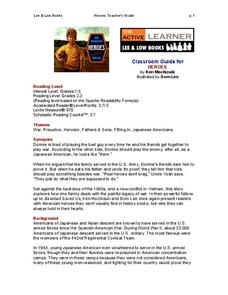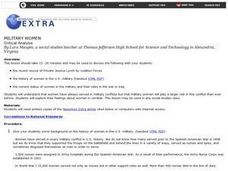Historical Thinking Matters
Spanish-American War: 3 Day Lesson
Why did the United States choose to invade Cuba in 1898? As part of a 3-day activity, your young historians will first develop working hypotheses to answer this question, then work with a variety of historical primary source documents...
National Endowment for the Humanities
The Matter of the Philippines
The United States won the Spanish-American War, so now what? Young scholars act as advisors to President McKinley and use primary sources to recommend what America should do with its territories. Using a variety of perspectives—including...
US House of Representatives
Exclusion and Empire, 1898–1941
New ReviewOften forgotten and written off as the model minority, Americans with heritage in Asia and the Pacific Islands have played an essential role in American history, including Congress. Budding historians reclaim history by researching the...
US House of Representatives
Hispanic Americans in Congress During the Age of U.S. Colonialism and Global Expansion, 1898–1945
New ReviewTo be Puerto Rican, in the words of one politician, is to be "foreign in a domestic sense." Young historians consider the American role in colonialism and its impacts on Hispanic Americans through the first part of the twentieth century...
Alabama Department of Archives and History
Yellow Journalism
What role did yellow journalism play in bringing the United States into war with Spain? As part of their study of the Spanish-American War, class groups examine newspapers of the times and other texts and then produce their own...
Roy Rosenzweig Center for History and New Media
War and Poetry
A band of brothers or the Devil's agents? Nobel warriors freeing the oppressed or mercenaries working for the military/industrial complex? Groups examine poems from the Civil War, World War I, and World War II to determine the poets'...
Curated OER
Whose Side Are You On?
Learners role play, persuading and staying neutral during arguments. In this viewpoint instructional activity, students examine the viewpoints of soldiers in the Spanish-American War and role play. After a discussion, some learners try...
Little Kids Rock
The Influence of Latin Music in Postwar New York City
Music has often been called the international language that transcends cultures and regions. Scholars analyze the impact of Latin American music on New York City culture in the years following World War II. They research music, video,...
Curated OER
Heroes
Students explore reading comprehension strategies. In this character development and reading comprehension lesson, students brainstorm common traits of "heroes." Students read Heroes, then identify the personal conflicts the story...
Historical Thinking Matters
Rosa Parks: 5 Day Lesson
What led to the success of the Montgomery Bus Boycott, and how might historians approach this question differently? This rich series of lessons includes a short introductory video clip, analysis of six primary source documents, and...
Curated OER
Say It Loud!: A Celebration Of Black Music In America Music In America
Students study early New Orleans Jazz music and recognize Louis Armstrong as an early jazz artist. They recognize the elements and roots of Jazz.
Curated OER
Military Women
Students review the history of female participation in the armed forces and throughout various conflicts. They participate in a class discussion and consider many of the controversial issues surrounding women in the military.













